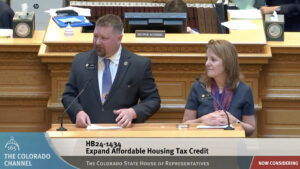One year after Gov. Jared Polis saw local-government backers block his land-use reform bill and then vetoed his party’s efforts to give cities and counties right of first refusal on some apartment sales, he signed two housing bills Thursday that attack the issues in new ways.
In separate ceremonies, Polis inked a scaled-down measure granting cities and counties new rights of first refusal and offer and made law a bill that provides those governments technical and financial assistance in conducting housing-needs assessments. He also signed a bill tripling the amount of low-income housing tax credits available to developers, all of which happened one day after he put his John Hancock on a compromise wetlands-protection bill that will impact development across the state.
With the actions, the Democratic governor officially ended the affordable-housing debates that, at times, dominated a session focused on addressing Colorado’s soaring cost of living that’s driven in no small part by a shortage of housing options. And he showed his willingness to back away from a single, wide-ranging solution of his creation to address the issue and instead work with legislators and groups with whom he’s disagreed.
“Concern over skyrocketing housing costs is top of mind for all Coloradans. We made bold promises and are delivering real results to save Coloradans money,” Polis said in a news release on Thursday. “These laws will invest to help Colorado grow sustainably, boost the supply of housing Coloradans can afford, and make sure Colorado is planning for a more affordable and sustainable future.”
What the final housing package involves
Polis already had signed four of the major pieces of his affordable-housing package shortly before or after the May 8 adjournment of the 2024 legislative session. Those bills require metro areas to boost zoning density in areas around transit lines, allow homeowners to build accessory dwelling units on properties, eliminate minimum-parking requirements in many urban areas and ban local limits on unrelated occupants of homes.

A neighborhood sits just south of the Westminster Station public-transit area. Gov. Jared Polis wants more housing built around transit centers.
In a morning event in Olde Town Arvada, the governor signed two more bills that became de facto orbital bills in the package. One adds $128 million over eight years to Colorado’s $10 million annual affordable-housing tax credit that is oversubscribed now. The other requires the Colorado Department of Local Affairs to help fund local housing-needs assessments while conducting the first such study statewide.
Both bills were sponsored by legislators who fought Polis’ effort to pre-empt local land use authority via Senate Bill 213 last year and contributed to its death on the final day of the 2023 session. The housing-needs assessment bill, SB 174, largely was the product of the Colorado Municipal League, the leading opponent of most of Polis’ land-use-reform efforts both last year and this year, which offered it as an alternative and won bipartisan backing.
“SB 174 is the most impactful housing bill to become law in decades,” said Kevin Bommer, CML executive director, in a news release. “Instead of contentious and legally questionable preemptions and mandates that could further delay the ability of Colorado cities and towns to meet the needs of current and future residents and businesses, SB 174 is built on the principle of ‘Partnership, Not Preemption.’”
Adversaries become allies in some ways
The bill does require most local governments with a population of at least 1,000 people to conduct housing-needs assessments by the end of 2026 and then submit housing plans to DOLA by January 2028 that must be updated every six years going forward. But it allows DOLA to provide grants and technical assistance to help cities — a much different tact than the unprecedented regulatory authority that SB 23-213 had proposed giving the agency to enforce its increased density requirements.

Colorado state Rep. Shannon Bird listens as Rep. Ron Weinberg speaks about a housing tax-credit bill that the two sponsored together.
“Our state has an important opportunity to partner with local governments and help provide strategic resources to help them build more affordable communities,” said Rep. Shannon Bird, a Westminster Democrat who ran both SB 174 and the tax-credit measure, House Bill 1434, along with bipartisan cosponsors. “Colorado’s population has grown significantly over the last decade and SB 174 creates the necessary roadmap for how our state can best support local communities as they build more housing to meet the needs of residents and businesses.”
The past year made a big difference as well for local-government efforts to create a right of first refusal over some apartment-complex sales to try to buy the properties and maintain or increase their limited stocks of affordable housing. Polis vetoed the 2023 effort, which would have allowed the governments to use the new right to match any offer on complexes of a certain age and size and to convert market-rate housing to income-restricted space.
Revamped right of first refusal
HB 1175, sponsored once again by Democratic Reps. Andy Boesenecker of Fort Collins and Emily Sirota of Denver, grants the right of first refusal only in instances where complexes already are contractually obligated through public funding to limit rent prices. In those cases, owners must inform cities or counties two years before the rent restrictions expire and give the governments time to prepare offers before the properties hit the market.
But it also creates a new right of first offer through which owners must tell governments before they list for sale any property that is between 15 and 100 units and is at least 30 years old. Cities and counties then have seven days to request more information, 14 more days to make an offer, 30 extra days to negotiate final terms if the seller accepts the offer and 60 days to close on the complex.
Apartment operators and builders warned that the timelines will slow what is normally a much quicker process and would lead investors to focus their capital on states without such restrictions. That then would reduce the stock of affordable housing that would come into Colorado, defeating the purpose of backers who say they want to ensure professionals from teachers to police officers can afford to live in their communities, they said.

Colorado state Reps. Andy Boesenecker and Emily Sirota seek concurrence on their right-of-first-refusal bill on May 8 in the House.
But supporters of the bill argue that the new tool will be used in limited fashion to stop out-of-state investors from swooping in to gobble up naturally affordable older properties, improving them and displacing residents by boosting rents. They made numerous changes to the bill during the legislative process, responding to repeated concerns from Polis to ensure the signature that he gave to it on Thursday.
Wetlands bill affects housing too
“This year, we’re tackling Colorado’s housing crisis from all angles,” said Sen. Faith Winter, the Broomfield Democrat who cosponsored HB 1175. “By giving local governments an additional tool to preserve affordable housing stock, Coloradans will be better positioned to find housing options that fit their budget.”
Polis also, on Wednesday, signed HB 1379, a bill creating new protections for Colorado streams and wetlands after a 2023 U.S. Supreme Court decision limited the reach of the federal Clean Water Act. It creates a new program within the Colorado Department of Public Health and Environment to regulate dredge-and-fill activities in which home or road builders disturb ground in any way that affects the flow of the state’s waters.
The bill, originally Democrat-sponsored and backed by a bevy of environmental groups, competed with a bipartisan measure supported by Colorado Water Congress that had a more limited scope of protections. When both bills began advancing through their chambers, the sponsors got together and negotiated a compromise that still protects a larger swath of waters than federal law had regulated but requires quicker permitting.
“Colorado is a headwaters state, and our rivers supply millions of people in the United States with water needed for drinking, agriculture, industry and outdoor recreation,” said Sen. Barbara Kirkmeyer, R-Brighton, whose competing bill wrapped into HB 1379. “We are proud that this bill will protect our environment and protect critical investments in affordable housing as our state grows towards a responsible future.”
